Module 10 Spring Festival Unit2 My mother’s cleaning our house and sweeping away bad luck课件(共26张PPT)
文档属性
| 名称 | Module 10 Spring Festival Unit2 My mother’s cleaning our house and sweeping away bad luck课件(共26张PPT) |
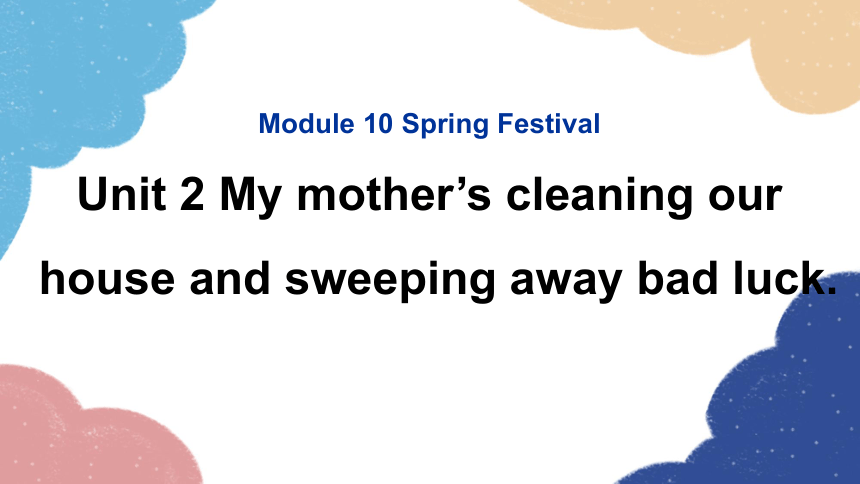
|
|
| 格式 | pptx | ||
| 文件大小 | 6.1MB | ||
| 资源类型 | 教案 | ||
| 版本资源 | 外研版 | ||
| 科目 | 英语 | ||
| 更新时间 | 2022-10-05 11:57:34 | ||
图片预览

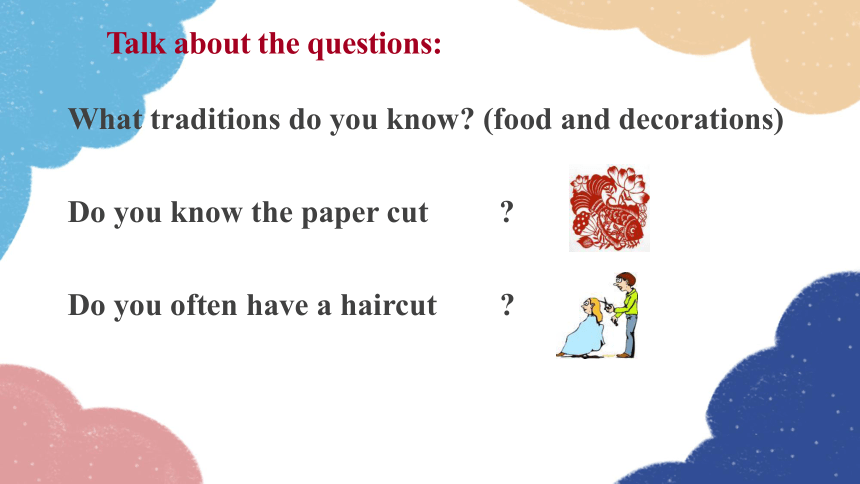

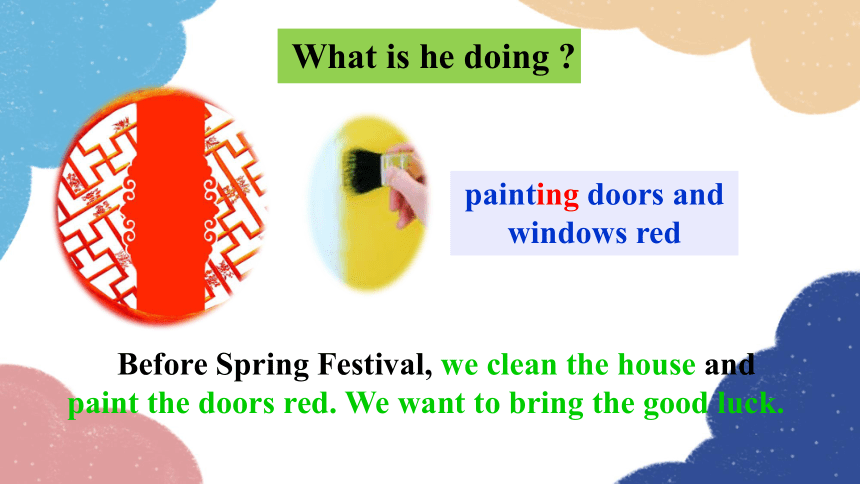
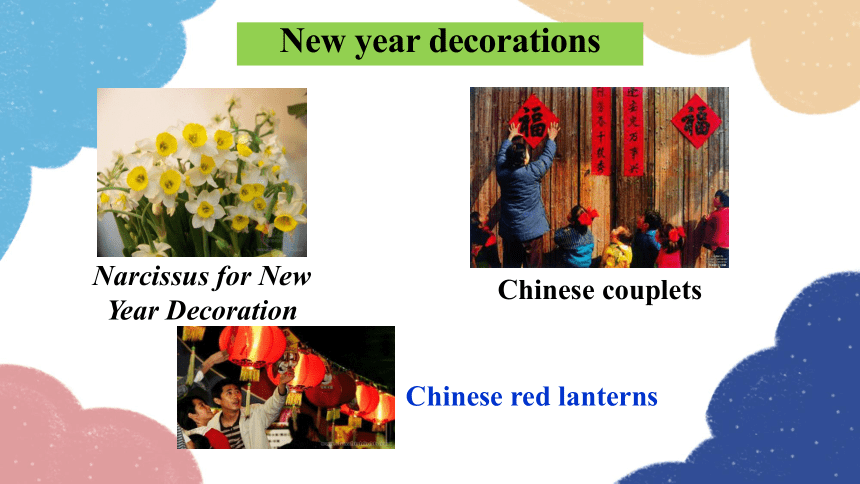
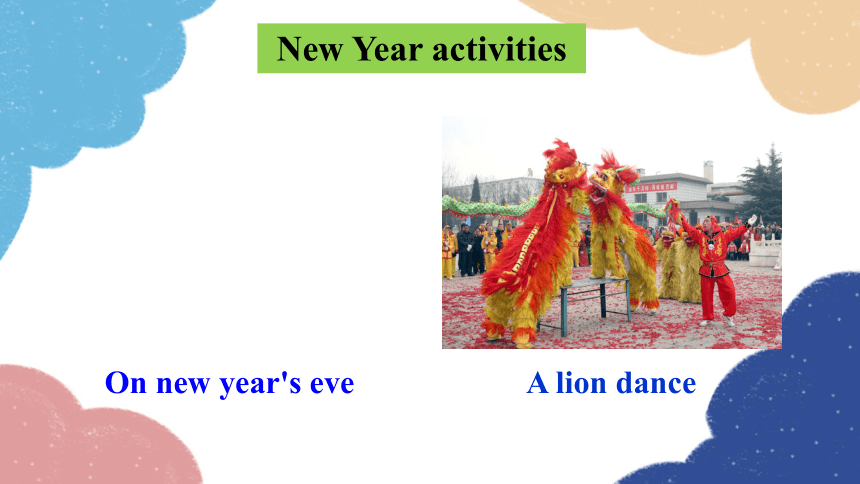
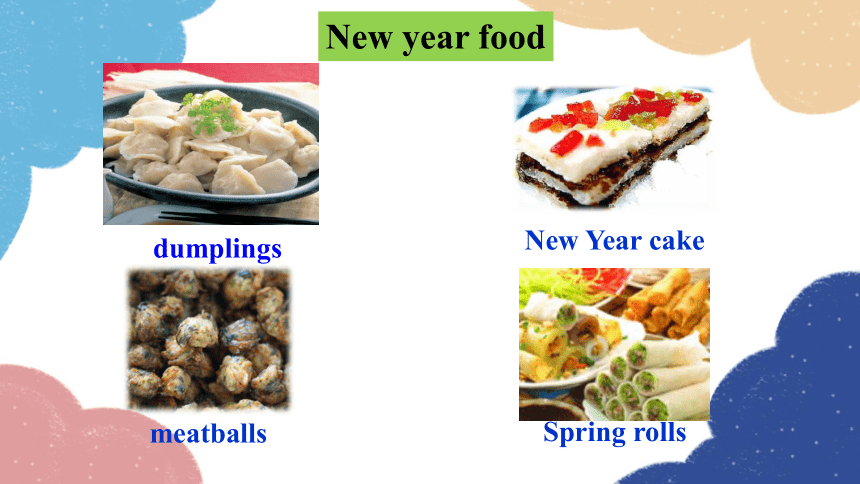
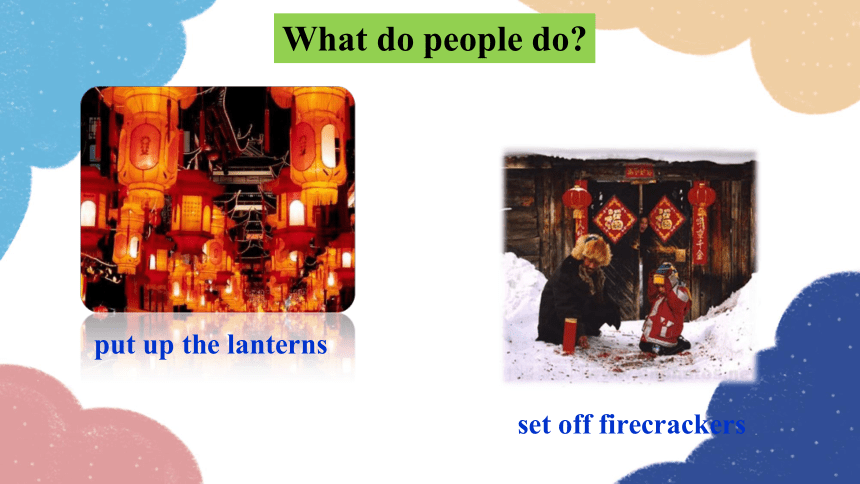
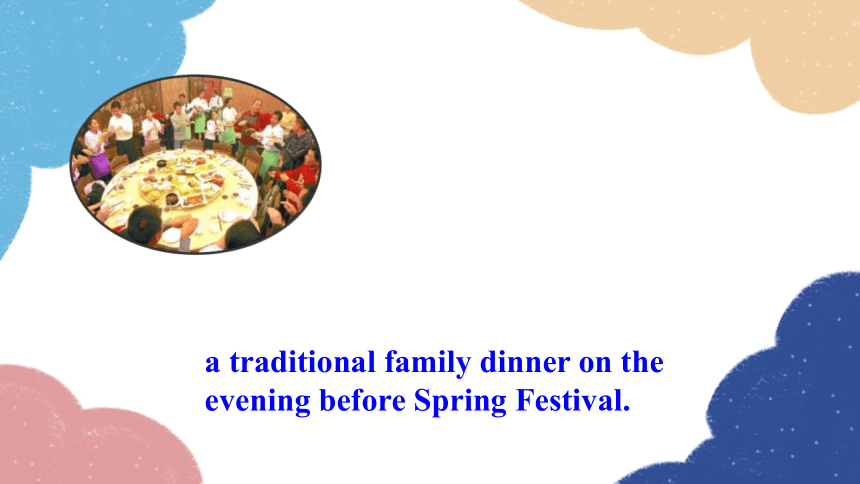
文档简介
(共26张PPT)
Module 10 Spring Festival
Unit 2 My mother’s cleaning our house and sweeping away bad luck.
Talk about the questions:
What traditions do you know (food and decorations)
Do you know the paper cut
Do you often have a haircut
cleaning the house
What is he doing
painting doors and windows red
What is he doing
Before Spring Festival, we clean the house and paint the doors red. We want to bring the good luck.
New year decorations
Chinese couplets
Narcissus for New Year Decoration
Chinese red lanterns
On new year's eve
A lion dance
New Year activities
dumplings
meatballs
New Year cake
Spring rolls
New year food
set off firecrackers
put up the lanterns
What do people do
a traditional family dinner on the evening before Spring Festival.
Hong Bao or Red Packet
wish a Happy New Year
—What’s Li Shan’s mother doing
—She’s cleaning the house.
Reading and vocabulary
1.Work in pairs. Look at the pictures and talk about what’s happening.
2.Listen and answer.
1. When does the Spring Festival usually come
2. What should mother do before Spring Festival
3. How are the people celebrating on the Spring Festival evening
Usually in February, but sometimes in January.
Clean the house, sweep away bad luck and
buy lots of food.
Having a traditional family dinner and watching a special programme on TV.
3.Complete the passage with the correct words and expression from the box.
celebrate dumplings few luck mean programme sweep away traditional
We (1) _________ Spring Festival in January or February. A (2) ______ days before Spring Festival we clean
celebrate
few
our homes and (3) ____________ all the bad (4) _____. In the evening before Spring Festival we have a big family dinner. We eat lots of (5) _________ food, such as jiaozi – a kind of (6) __________. We usually watch a special (7) ___________ on television, and parents usually give their children a hongbao. It (8) ________ lucky money.
sweep away
luck
traditional
dumplings
means
programme
1. with prep. 和,带有,用
She goes shopping with me.
她和我一起去逛街。
Uncle Li is a tall man with a long white beard.
李叔叔是一位留着长胡子的高个头男士。
We decorate the windows with paper cuts.
我们用剪纸装饰窗户。
Language points
2. It’s a few days before Spring Festival.
a few一些,表示肯定的概念,修饰可数名词复数。few作形容词,表示否定的概念, 为“几乎没有”,修饰可数名词复数。
拓展:few, a few, little, a little这四个词都有“一点儿”的意思,其用法既有相同之处,又有相异之处。读下面例子并总结:
Few people know it.
很少有人知道此事。
There’s little milk in the glass.
杯里几乎没有牛奶了。
A few people know it.
有一些人知道此事。
There’s a little milk in the glass.
杯里还有一点牛奶。
【结论】
few 意为“很少;几乎没有”,表否定含义
修饰_____名词复数
a few 意为“几个;有一些”,表肯定含义 little 意为“很少;几乎没有”,表否定含义 修饰_______
名词
a little 意为“一点;一些”,表肯定含义 不可数
可数
【运用】
请根据句意选用few, a few, little或a little填空。
1. There are _____ books on the desk. You can borrow one.
2. We have ____ rain this spring. The trees and grass don’t grow well.
a few
little
3. There are ___ new words in the text,
but I don’t understand it.
4. — May I talk with you, Lucy
— Sure, but only ______ time.
I am very busy.
a little
few
The notes about Christmas in Britain.
a) go shopping for presents
b) have a traditional family dinner
c) open presents on Christmas Day
d) put the presents next to the Christmas tree
Writing
Learning to learn
e) get lots of food ready
f) sing Christmas songs
g) say Merry Christmas to family and friends
h) have a Christmas tree
When you write new words, write them under headings, in groups or in a word map. Use pictures and drawings.
Getting ready ____________
Presents ____________
Traditional things on Christmas Day
________________________________
a, d, e, h
a, c, d
b, c, f, g, h
4.Look at the notes about Christmas in Britain. Match the notes with the headings.
Join two notes and write one sentence with and.
For example: go shopping for presents;
get lots of food ready
They go shopping for presents
and they get lots of food ready.
You can leave out the second they.
They go shopping for presents
and get lots of food ready.
5.Write sentences
Getting ready
People go shopping for presents and get lots of food ready.
6.Choose one of the headings in Activity 4 and write about Christmas in Britain.
1. Preview the new words and expressions in Unit 3.
2. Finish the exercise on the students’ book.
Homework
Module 10 Spring Festival
Unit 2 My mother’s cleaning our house and sweeping away bad luck.
Talk about the questions:
What traditions do you know (food and decorations)
Do you know the paper cut
Do you often have a haircut
cleaning the house
What is he doing
painting doors and windows red
What is he doing
Before Spring Festival, we clean the house and paint the doors red. We want to bring the good luck.
New year decorations
Chinese couplets
Narcissus for New Year Decoration
Chinese red lanterns
On new year's eve
A lion dance
New Year activities
dumplings
meatballs
New Year cake
Spring rolls
New year food
set off firecrackers
put up the lanterns
What do people do
a traditional family dinner on the evening before Spring Festival.
Hong Bao or Red Packet
wish a Happy New Year
—What’s Li Shan’s mother doing
—She’s cleaning the house.
Reading and vocabulary
1.Work in pairs. Look at the pictures and talk about what’s happening.
2.Listen and answer.
1. When does the Spring Festival usually come
2. What should mother do before Spring Festival
3. How are the people celebrating on the Spring Festival evening
Usually in February, but sometimes in January.
Clean the house, sweep away bad luck and
buy lots of food.
Having a traditional family dinner and watching a special programme on TV.
3.Complete the passage with the correct words and expression from the box.
celebrate dumplings few luck mean programme sweep away traditional
We (1) _________ Spring Festival in January or February. A (2) ______ days before Spring Festival we clean
celebrate
few
our homes and (3) ____________ all the bad (4) _____. In the evening before Spring Festival we have a big family dinner. We eat lots of (5) _________ food, such as jiaozi – a kind of (6) __________. We usually watch a special (7) ___________ on television, and parents usually give their children a hongbao. It (8) ________ lucky money.
sweep away
luck
traditional
dumplings
means
programme
1. with prep. 和,带有,用
She goes shopping with me.
她和我一起去逛街。
Uncle Li is a tall man with a long white beard.
李叔叔是一位留着长胡子的高个头男士。
We decorate the windows with paper cuts.
我们用剪纸装饰窗户。
Language points
2. It’s a few days before Spring Festival.
a few一些,表示肯定的概念,修饰可数名词复数。few作形容词,表示否定的概念, 为“几乎没有”,修饰可数名词复数。
拓展:few, a few, little, a little这四个词都有“一点儿”的意思,其用法既有相同之处,又有相异之处。读下面例子并总结:
Few people know it.
很少有人知道此事。
There’s little milk in the glass.
杯里几乎没有牛奶了。
A few people know it.
有一些人知道此事。
There’s a little milk in the glass.
杯里还有一点牛奶。
【结论】
few 意为“很少;几乎没有”,表否定含义
修饰_____名词复数
a few 意为“几个;有一些”,表肯定含义 little 意为“很少;几乎没有”,表否定含义 修饰_______
名词
a little 意为“一点;一些”,表肯定含义 不可数
可数
【运用】
请根据句意选用few, a few, little或a little填空。
1. There are _____ books on the desk. You can borrow one.
2. We have ____ rain this spring. The trees and grass don’t grow well.
a few
little
3. There are ___ new words in the text,
but I don’t understand it.
4. — May I talk with you, Lucy
— Sure, but only ______ time.
I am very busy.
a little
few
The notes about Christmas in Britain.
a) go shopping for presents
b) have a traditional family dinner
c) open presents on Christmas Day
d) put the presents next to the Christmas tree
Writing
Learning to learn
e) get lots of food ready
f) sing Christmas songs
g) say Merry Christmas to family and friends
h) have a Christmas tree
When you write new words, write them under headings, in groups or in a word map. Use pictures and drawings.
Getting ready ____________
Presents ____________
Traditional things on Christmas Day
________________________________
a, d, e, h
a, c, d
b, c, f, g, h
4.Look at the notes about Christmas in Britain. Match the notes with the headings.
Join two notes and write one sentence with and.
For example: go shopping for presents;
get lots of food ready
They go shopping for presents
and they get lots of food ready.
You can leave out the second they.
They go shopping for presents
and get lots of food ready.
5.Write sentences
Getting ready
People go shopping for presents and get lots of food ready.
6.Choose one of the headings in Activity 4 and write about Christmas in Britain.
1. Preview the new words and expressions in Unit 3.
2. Finish the exercise on the students’ book.
Homework
同课章节目录
- Starte
- Module 1 My teacher and my friends
- Module 2 My English lesson
- Module 3 My English book
- Module 4 My everyday life
- Module 1 My classmates
- Unit 1 Nice to meet you.
- Unit 2 I'm Wang Lingling and I'm thirteen years ol
- Unit 3 Language in use.
- Module 2 My family
- Unit 1 Is this your mum?
- Unit 2 These are my parents.
- Unit 3 Language in use.
- Module 3 My school
- Unit 1 There are thirty students in my class.
- Unit 2 The library is on the left of the playgroun
- Unit 3 Language in use.
- Module 4 Healthy food
- Unit 1 We've got lots of apples.
- Unit 2 Is your food and drink healthy?
- Unit 3 Language in use.
- Module 5 My school day
- Unit 1 I love history.
- Unit 2 We start work at nine o'clock.
- Unit 3 Language in use.
- Revision module A
- Module 6 A trip to the zoo
- Unit 1 Does it eat meat?
- Unit 2 The tiger lives in Asia.
- Unit 3 Language in use.
- Module 7 Computers
- Unit 1 How do I write my homework on the computer?
- Unit 2 When do you use a computer?
- Unit 3 Language in use.
- Module 8 Choosing presents
- Unit 1 I always like birthday parties.
- Unit 2 She often goes to concerts.
- Unit 3 Language in use.
- Module 9 People and places
- Unit 1 We're enjoying the school trip a lot.
- Unit 2 They're waiting for buses or trains.
- Unit 3 Language in use.
- Module 10 Spring Festival
- Unit 1 Are you getting ready for Spring Festival?
- Unit 2 My mother's cleaning our houses and sweepin
- Unit 3 Language in use.
- Revision module B
